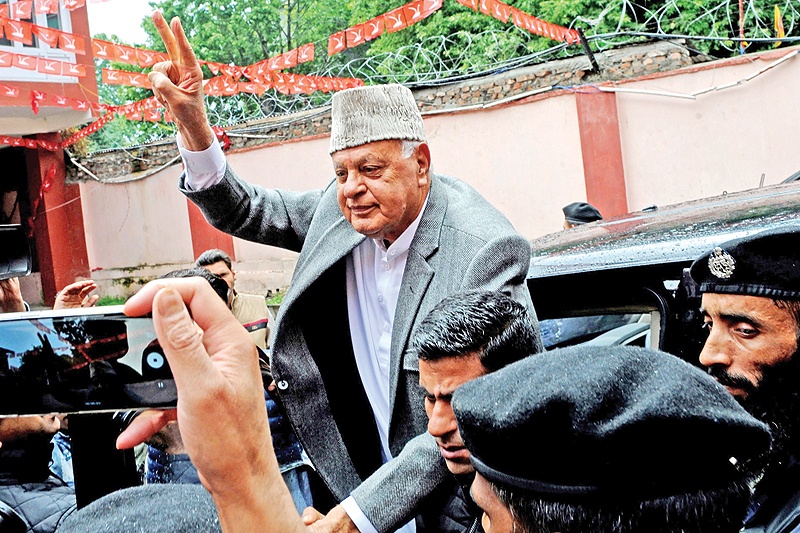Amnesty chief vows to defy India bid to 'crush' criticism
NEW DELHI: A former Jammu and Kashmir chief minister, seen as being pro-India, has been formally arrested under a law allowing him to be held for up to two years without charge, authorities said yesterday. Farooq Abdullah, 81, has been under house arrest since early August when India stripped Kashmir of its autonomy, imposed a security lockdown and detained dozens of local politicians including those who back the region being part of India. But on Monday he was formally arrested under the Public Safety Act (PSA) and his home turned into a "judicial lockup", Muneer Khan, a senior police official in Kashmir said.
It is the first confirmed case of a Kashmiri politician being arrested under the PSA since India's August 5 move when it sent tens of thousands of troops to Kashmir and imposed a communications blackout. India's national security adviser said earlier this month that a "majority" of Kashmiris supported its move except for a "vocal minority" backed by Pakistan, which India accuses of backing a decades-old insurgency that has killed tens of thousands of people. But in the wake of the lockdown, even pro-India politicians have spoken out about New Delhi's intervention.
A day after the Indian government revoked the special status, Abdullah climbed a wall of his house to address the media and condemned the move. That was the last time he was seen in public. "Why could they not wait? After 70 years, they have stabbed the people of the state. As soon as our gates open, our people will be out. "We will fight, we will go to the courts. We're not gun-runners, grenade-throwers, stone-throwers, we believe in a peaceful resolution of things," Abdullah said.
1947 split
The PSA was introduced in the 1970s - under Abdullah's father Sheikh Abdullah - to prevent timber smuggling but since an uprising against Indian rule erupted in 1989 it has been used to detain thousands of people, activists say. The UN human rights office said in 2018 that special laws in Kashmir including the PSA "have created structures that obstruct the normal course of law, impede accountability and jeopardize the right to remedy for victims of human rights violations".
Amnesty International in June said that the PSA "circumvents the criminal justice system in Jammu & Kashmir to undermine accountability, transparency, and respect for human rights". Kashmir has been split between India and Pakistan since 1947 and since then the two nuclear-armed neighbors India and Pakistan have fought two wars over the region.
Mobile phones and the internet remain cut off in much of the Kashmir Valley, the hotbed of resistance to Indian rule, more than six weeks after New Delhi's move, which it says is aimed at boosting the region's economy. In the same period India arrested more than 4,000 people, 3,000 of whom were subsequently released, with nearly 200 civilians and 415 members of the security forces injured in hundreds of protests, a senior government source told AFP last week.
Bid to 'crush' criticism
Meanwhile, Amnesty International's chief vowed Monday that the rights group would not be silenced on raising concerns about Kashmir despite what he called intimidation by Indian Prime Minister Narendra Modi's government. India's financial crime investigators recently accused Amnesty's local branch of violating foreign exchange regulations through taking money from its London-based parent.
That claim came after Amnesty vocally criticized Modi's Hindu nationalist government on Kashmir, which was India's only Muslim-majority state until New Delhi stripped its autonomy last month. "The Modi government has made a very big attempt to crush Amnesty in India," Kumi Naidoo, Amnesty International's secretary-general, told AFP on a visit to Washington.
"On the Kashmir question, on various human rights questions in India itself, we are not intimidated," he said. "While our colleagues in our Indian office are under stress, they are as committed, motivated and courageous as ever, if not more, as a result of the repression that we face." Modi's government has cracked down on foreign non-governmental organizations since coming to power in 2014, suspending or banning thousands of groups, many working in health or the environment, for receiving money from abroad.
Naidoo, however, said that Amnesty - whose Bangalore office was raided last year - would survive in India as it has funding from local donors. Amnesty has faced heated criticism from India's right wing for its stance on Kashmir, where authorities have largely shut down the internet, mobile service and initially also landlines. "It is a horrific thing to actually cut people's legitimate way of communicating with each other completely," Naidoo said.
"There are life-and-death issues associated with doing that. Whether it is family members needing to communicate with each other, being able to go to the doctor's, this is something that governments need to stop doing," he said. "And, sadly, there are more and more governments doing it, and we need to speak out against this very strongly." India argues that the measures are temporary and have helped ensure calm in Kashmir, charging that rival Pakistan is trying to stir up trouble.- Agencies


